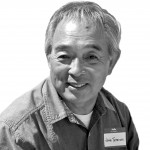I told him he was nuts, that they would chew him up and spit him out in little pieces.
I was talking with Guy Aoki, founding member and at the time of our conversation, the president of MANAA, Media Action Network for Asian Americans, the Los Angeles-based watchdog organization dedicated to ensuring sensitive and balanced portrayals of Asian Americans in the entertainment media.
The year was 2001, and Aoki was preparing for a confrontation with comedienne Sarah Silverman on Bill Maher’s popular show “Politically Incorrect,” which aired on ABC television before it got abruptly canceled for crossing what were certain media standard and practices lines.
The backstory that led to Aoki’s appearance on “Politically Incorrect” began when Silverman appeared on Conan O’Brien’s late-night talk show and told a “chink” joke, a word she used not just once but twice.
Aoki got on her case, and as we would learn when they were both on “Politically Incorrect,” she apparently read Guy’s comments in whatever media outlets printed his response to her use of the slur.
So in August, enter Guy Aoki and Sarah Silverman on Bill Maher’s program, with Silverman clearly having the advantage because, well, let’s face it, she’s a popular comedienne who that fall was about to get her own TV program, while Guy Aoki was, to the audience and to Maher, little more than someone with a beef. Forget that he was president of MANAA because that part of the introduction went virtually unnoticed.
Without belaboring the point, suffice it to say, there was not one instance where Guy let either Silverman or Maher intimidate him (as you may know, Maher also has this thing about Asians as well), and judging by the audience response, which at first seemed to support Silverman but sided with Aoki by the end, Guy more than held his own.
It was a commanding performance, and I for one admired how Guy controlled so much of the conversation. That’s not easy to do if you’re not regularly on the air, and I also know from experience that some hosts can be difficult and even brutal, and in his case, Guy was being ganged up on but never faltered.
It was an important moment for us because those on the set with Aoki, those in the live audience, and those watching this very popular program on television learned that you can’t screw with an Asian American, that we’re not going to let those who would abuse our sensibilities get away with it, and to those who would abuse us publicly, beware.
That was an important message, and honestly, as often as I used to be on the air and on those nasty talk shows during the redress days and for at least a couple of years after 9/11, I’m not sure I could have driven the same message home as effectively as Guy did that evening on national television. We have very different styles, and for that moment on Maher’s program, his was perfect.
While recognizing Guy for his gutsy performance, his example is part of the broader message we send when we deal with media, which has enormous influence over how others perceive us. That’s why MANAA and other watchdog groups like them (I’m sure there must be others but I’m just not aware of them) are so important.
It’s straight forward enough working with news media, whether print or electronic, but I found that it’s quite a different matter working with the entertainment side of the business because there, it’s all about big money and big names. And in that world, it’s clear that the focus is on what attracts audiences.
In 2001, I was invited to join a coalition of APAs in meetings with some of the network executives to discuss programming issues. The APA Media Coalition, of which the JACL is a participant along with MANAA and other APA organizations, was established to monitor and rate the major television networks in their employment of APA actors, their roles and the networks’ sensitivity to the treatment of Asian characters.
Each year, the APAMC issues an annual report card, rating each network for the previous season, noting in detail a variety of issues and concerns about the way in which each network deals with the concerns of the APAMC.
I’m not sure at this point if the Coalition is still active since there is no report card for 2013 on the MANAA site, where the report card normally appears. If it is inactive, that would be unfortunate because the report card puts the networks on notice that they’re being watched and evaluated and gives MANAA the platform for confronting those who think nothing of offending us.
The JACL is an advocacy organization, so we all know that nothing is as effective as face-to-face confrontation in dealing with those who would mock or belittle us as a community. That’s why someone like Guy Aoki on “Politically Incorrect” or MANAA or APAMC are important to us.
And we know that in dealing with comedians like Maher or Silverman or the hosts of any of the networks evening talk shows, you can only be effective if you don’t let them dominate the conversation.
Otherwise, it’s just a pointless conversation: They win, and you come out the fool.
John Tateishi is a former JACL National Director.




